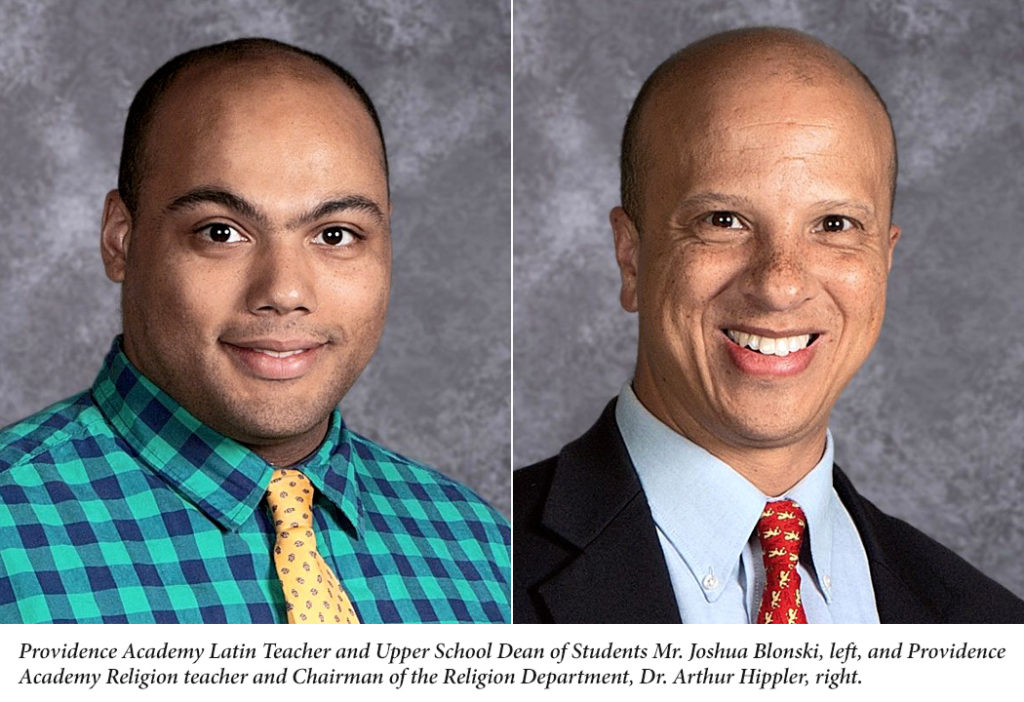
Providence Academy’s Dr. Arthur Hippler and Mr. Joshua Blonski were featured in an article published today, Wednesday, June 10, 2020, in the National Catholic Register.
The article, “Black Catholics Call the Faithful to Listening, Reflection Following George Floyd Killing,” features Dr. Hippler and Mr. Blonski in two separate sections, Church Teaching on Justice and Harmful Narratives and Prudence, respectively. Excerpts from the article are located below:
Church Teaching on Justice
Arthur Hippler, who teaches religion at Providence Academy in Plymouth, Minnesota, and is the author of Citizens of the Heavenly City: A Catechism of Catholic Social Teaching, spoke to the Register about the incident in relation to Church teaching on justice.
“The killing of George Floyd was an injustice, but it’s an injustice where the perpetrators have been arrested,” he said. “But what exactly did the people in these neighborhoods of St. Paul and Minneapolis do to deserve to have their grocery stores ransacked and their neighborhoods burned?”
In response to the rioting, Hippler quoted Pope St. John Paul II’s 1980 encyclical Dives in Misericordia on distortions of justice.
“‘An eye for an eye and a tooth for a tooth.’ This was the form of distortion of justice at that time; and today’s forms continue to be modeled on it,” Pope John Paul II wrote, “in the name of an alleged justice (for example, historical justice or class justice) the neighbor is sometimes destroyed, killed, deprived of liberty or stripped of fundamental human rights. The experience of the past and of our own time demonstrates that justice alone is not enough, that it can even lead to the negation and destruction of itself, if that deeper power, which is love, is not allowed to shape human life in its various dimensions” (12).
He also cited the Pontifical Commission on Justice and Peace’s 1983 document “The Church and Racism: Toward a More Fraternal Society,” which said “racism will disappear from legal texts only when it dies in people’s hearts.”
He said Rev. Martin Luther King Jr. spoke to “people’s moral sensibilities” and called King’s “Letter From Birmingham Jail” “an important text for understanding what we in the Catholic world call the natural law.”
“The whole language of that letter is not ‘We need to pass a law; we need more statutes,’” Hippler said. “He’s appealing to people’s sense of fraternity and justice and goodwill. He’s appealing to people’s notions of a shared humanity; he’s appealing to people’s sense of the treatment of blacks as being historically unjust.”
“The root of racism is in the human heart, so you can’t change the human heart just by laws,” Hippler said. “The only thing that changes hearts is conversion.”
Harmful Narratives and Prudence
Joshua Blonski, the upper school dean of students at Providence Academy in Plymouth, said that when he first watched the video of Floyd’s killing he felt “overwhelming sorrow” at “the idea that someone taken into custody has their life taken from them when they are overwhelmingly outnumbered and surrounded.”
He added that his wife, who is white, “was more preoccupied with the thought, ‘What if that was you on the ground being restrained?’” Blonski, who is black, said that while he’s very supportive of the police, the video did make him question: “What systemwide problems are there that could lead to that incident? What can we do better?”
He called for improving “relationships between the police and the communities that they’re policing” and said people should be prudent about the messages they hear on social media, asking, “Are they giving a fair and balanced accounting of what’s happening?”
“Praying about something can actually be one of your strongest social-justice actions,” he added, “but to also not just limit it to prayer. … Whatever action an individual takes, it should be well thought out and it should just be informed.”
Blonski related an incident that occurred while his wife was getting groceries for their family and to donate to a food pantry serving those in damaged neighborhoods.
“She gets accosted by an African American man who starts yelling at her across the parking lot,” he said, “screaming, ‘You’re stealing food from blacks. Go to your own store. What are you doing here?’”
The man had no idea she was “bringing groceries home to her black husband and her black children, and we’re going to deliver a big portion of these groceries downtown to black families who have been left destitute,” he said. “We just really came to the conclusion — and this speaks to the larger picture — people have narratives and stories in their heads of others, black, white, whatever, and that story becomes their reality.”
As for the U.S. Church, Blonski said that this “is a time to reach out to those communities of color who are Catholic and to give guidance, to give counsel.” He added that “guidance for children” would be helpful, as it’s difficult “to talk to my 5-year-old, my 2-year-old about ‘there are some people who might not like daddy because of his skin color,’ which is a sad fact; but at the same time, it’s not everyone.”
He praised an open letter from a mother to her sons that his school shared on the topic.
The excerpts above were extracted from the article “Black Catholics Call the Faithful to Listening, Reflection Following George Floyd Killing,” published on June 10, 2020, in the National Catholic Register. The National Catholic Register is a national Catholic newspaper founded in 1927. Published content includes news and features from the United States, the Vatican, and worldwide on topics including culture, education, books, arts and entertainment, as well as interviews. The National Catholic Register is available in both a print edition as well as an online edition.
